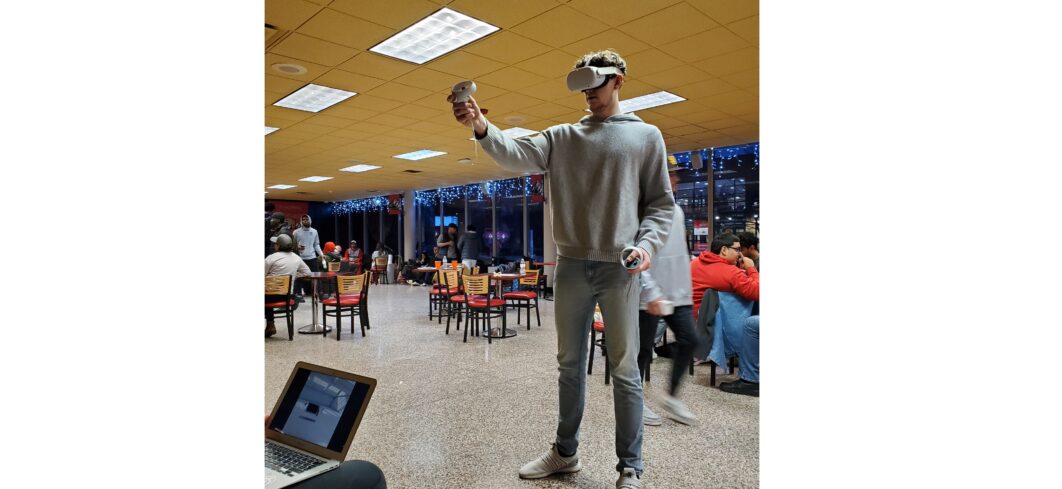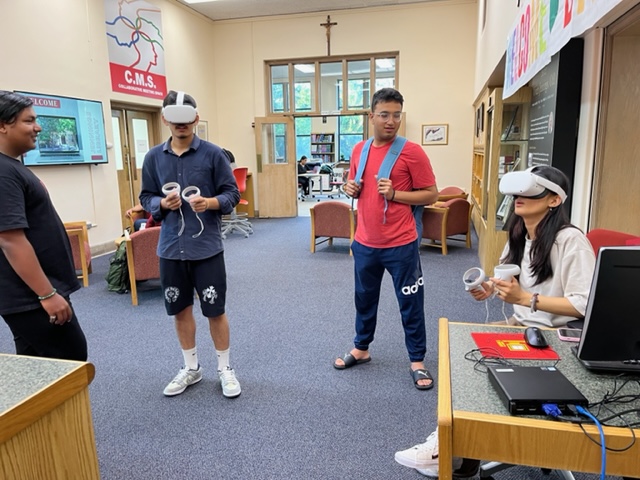Caldwell University
January 24, 2023
Virtual reality and other new additions at Jennings Library

Giovanni Cessel of the Sports Marketing Club at the VR gaming tournament during the Cougar World Cup in the fall.
Students and faculty returning for the spring semester are finding exciting new additions to Jennings Library including virtual reality (VR), remote printing, a repository for faculty and staff members’ work and a new catalog.
Virtual reality
Climb Mount Everest visit the Sistine Chapel or see the Mona Lisa at the Louvre. VR is the new addition to the Creation Station. Jennings Library has two Meta Quest 2 VR headsets available to students, faculty and staff. VR is a simulated experience that gives the user an immersive experience of a virtual world. Library Director Victoria Swanson says librarians are looking forward to faculty members partnering with them to incorporate VR into their curricula. “We are excited to offer this technology for multiple purposes. It is available for students and faculty to play and use the VR for gaming and also to explore educational opportunities relevant to their classes.”
Faculty and staff can book a two-hour session to use the VR in the Creation Station at Jennings Library.
Business Professor Neil Malvone and students Garret Ciccia, Nikko Matos, George Beghyn and Giovanni Cessel of the Sports Marketing Club partnered with Swanson and librarian Christina Getaz in the fall semester to put on a VR gaming tournament during their Cougar World Cup event. Cessel demonstrated how to use the technology and found that all the students who tried the sets “were amazed and kept asking me if they could borrow them.” For more information, see the VR Research Guide for tutorials.

New catalog
The Jennings Library search box has a new look and feel. “We have upgraded our discovery tool and book catalog for an easier, faster searching experience. With a single search box, users can search for everything or click the tabs to search separately for books, articles, journals, videos and music,” says Swanson. Users are required to have a valid Caldwell University ID card with a barcode to check out books and use the InterLibrary Loan. For more information about the new catalog, see the library’s guide or email library@caldwell.edu.
Remote printing
The library is now offering remote printing. Students can print from their phone, laptop, chromebook or tablet to the library printer by following these simple instructions.
Library student workers Evenny Peralta and Prerena Mahat have seen the efficiency. “It maximizes your time because you don’t have to sign into the desktops to print,” Peralta says. Student Tonianne Poccia, a marketing major with a management minor, is also very pleased about the new option because it is “quick, easy and accessible for students.”
New repository for faculty and staff work
The University Archives Office is pleased to announce a new institutional repository for faculty and staff works including journal articles, book chapters, conference papers/presentations, artwork, poetry and more. “Our goal is to showcase and preserve the scholarly and creative endeavors of Caldwell’s faculty and staff and to make the content as broadly accessible as possible while respecting copyright restrictions and limitation,” says archives librarian Kimberly Lynch. The repository can be viewed on the CUA’s digital collections site on JSTOR: https://www.jstor.org/site/caldwelluniversityarchives/institutional-repository/.
To learn more about the institutional repository and how faculty and staff can submit work, visit the archives website or contact Kim Lynch (kalynch@caldwell.edu).
Deselection project
Librarians and staff will be undertaking an extensive deselection project. Deselection is routinely done annually or biannually to keep the collection updated and relevant, Swanson explains. Librarians took part in a pilot deselection project with microfilm, print journals and oversize books and will continue with the rest of the print collection. They will be reaching out to faculty with a survey notifying them of the process and asking for input.





